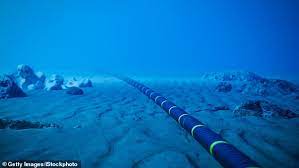Attacks on the UK’s undersea cables orchestrated by rogue states can be deterred using a “seabed warfare” strategy, a report has recommended, as military chiefs warn the country’s infrastructure is “extremely vulnerable” to sabotage.
A new report from the Policy Exchange think tank has warned that Russia, Iran and China could target undersea cabling surrounding the country that provides critical functions, such as the UK’s energy and financial systems.
Much of that cabling lines seabeds on the Atlantic Ocean, which the report, backed by a former defence secretary, states has become the theatre for a “new era of undersea warfare”.
The “undersea threat landscape” will require Britain to reshape its military strategy, it adds.
As “suspicious Russian activity” grows in and around the areas where Western nations keep their cables, the UK must adopt a “space-to-seabed” strategy.

The foreword to the report, written by Air Chief Marshall Lord Peach, states that recent cable-cutting incidents and suspicious activity in nearby waters signal that the world has “arrived in a new era of undersea warfare”.
Lord Peach, the former Chief of the Defence Staff, added that combatting the growing threat would require security officials to change their approach to maritime policing.
He said: “Novel strategic thinking is required, not least on how we conceptualise maritime defence in the modern day.”
The lord is one of several high-profile figures to have backed the report, with Sir Michael Fallon, the former defence secretary from 2014 to 2017, and former First Sea Lord and security minister Admiral Lord West of Spithead also offering their support.
The report advocates for a new strategy that “fully appreciates” the growing undersea threat and states that clearer guidance is necessary for military chiefs and the owners of undersea cables regarding who is responsible for protecting them.
Authors have also called to make more funding available for ocean surveillance vessels and the Joint Maritime Security Centre.
Sir Michael said the additional protection would be necessary to ensure the UK maintains its economic and security links to other nations and defend against an “extreme vulnerability”.
He said: “Britain’s economy and security are heavily dependent on its subsea connections with North America, Europe and the Middle and Far East.
“These are valuable targets for our global competitors: we have already seen Russian attempts to interfere with Atlantic cables.
“By sounding the alarm over our extreme vulnerability, this compelling report demands that the government urgently adopt a robust strategic response across multiple theatres.”

